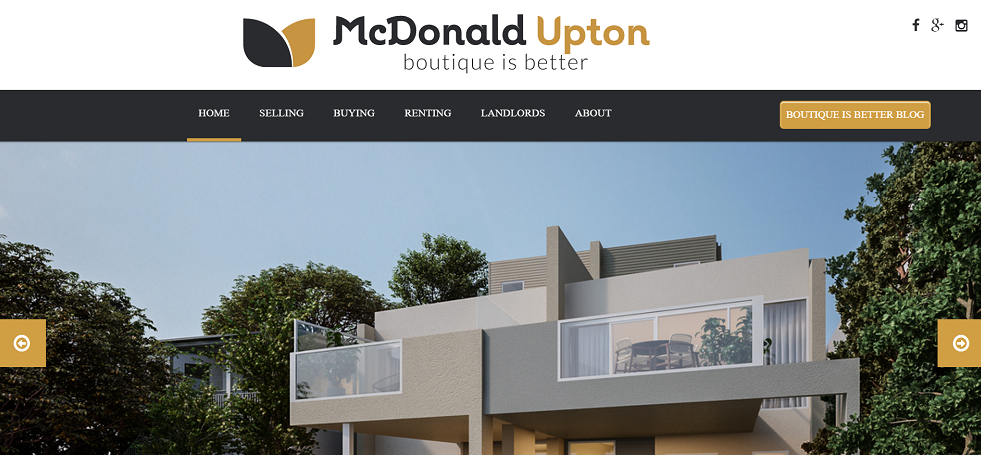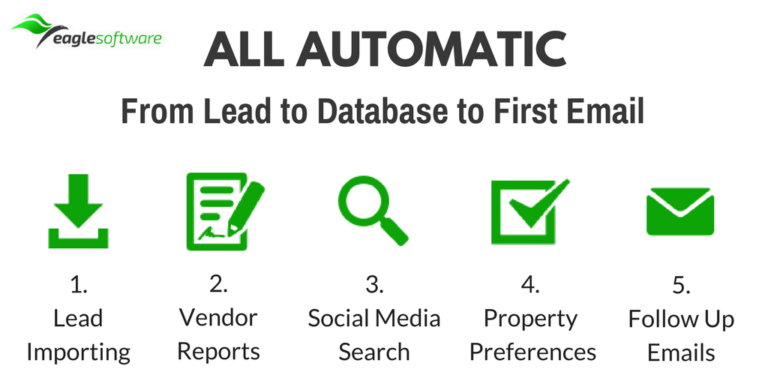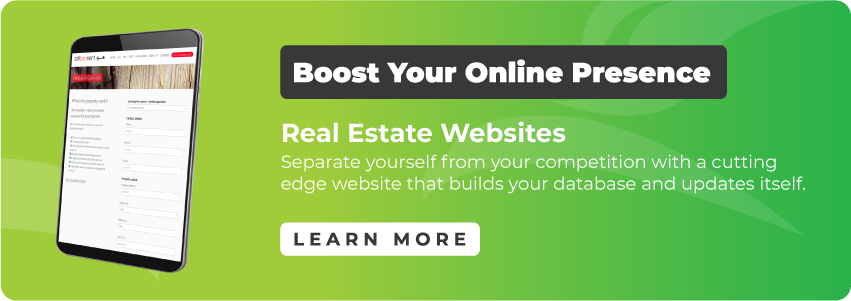In our digital-first world, not investing time and money in your real estate website is one of the biggest mistakes you can make. To illustrate this, we’ve gathered five of the most compelling reasons to put budget and resources behind what will become your lead-generating digital hub.
1. A real estate website is a prospect’s first impression
The saying “you never get a second chance to make a first impression” rings particularly true in the real estate business. Prospective clients are already forming their first impressions of your agency before you meet them — on your website.
Is your real estate website making a good first impression?
Imagine this scenario:
A prospect clicks to open your website and it takes ages to load. When it finally loads, they’re immediately greeted by poor real estate web design and ugly formatting. Then, they want to see what properties are listed but you don’t have a search bar (which is something that the best real estate websites will always have, no question). When the prospect clicks to learn more about you, they see you’re displaying agents who left your company 5 years ago. To add salt to the wounds, they try and send off an email but the links are broken!
Would you want to list a property on this real estate website? Would you feel comfortable buying a home from it?
Of course, this is an exaggeration, but the fact remains:
To prospects, your website is a direct reflection of your competence.
It doesn’t matter how good of an agent you are — if they’re turned off from meeting you by your website you’ll lose out on countless opportunities. For comparison, this is what a professional and organised website should look like:
To help you get started, here are five simple, practical changes you can make to your website to improve its presentation:
1) Use headings: Headings are important for the structure of a website. They also make it load faster and keep your text in uniform sizes and fonts.
2) Trim down your sidebar: A common feature of poor real estate web design is that the sidebar is crammed with entries, making it tough to navigate. Also, having too many options can confuse a user and make them leave your site.
3) Link each page with a purpose: Determine which content the user may want to read next after browsing a page. For example, after looking at the ‘About Us’ section, they might want to contact you — so provide a link to the ‘Contact Us’ page.
4) Keep your colour scheme simple: When it comes to selecting a colour palette for your real estate website, don’t go overboard. 3-4 colours is enough to create contrast and draw the user in. If you’re having trouble selecting colours, browse this
selection of 100 amazing combinations.
5) Get professional help! Website design is difficult and time-consuming, so if you want the best results you should look at hiring experienced real estate website developers with demonstrated success in the industry. We’ve got some great website packages that won’t break the bank, including the one shown above, so
come check them out.
2. It’s free marketing, 24/7
Unlike social media, you’re not competing with any other voices on your website. Once you lead people to it, you’ve got their undivided attention for a few seconds.
Also, instead of promoting portals, you can promote your own website when you share listings from your site on your marketing or social media channels. But be warned — users will often leave a site as quickly as they came if what you’re displaying doesn’t appeal. This is called ‘bounce rate’.
Bounce rate: the % of users who immediately leave (usually within 10 seconds) rather than viewing more pages.
Here are four quick tips to make your real estate website a more effective marketing tool to lower the bounce rate:
1) Only display relevant content to your audience. It could be a direct marketing sale, like advertising new rentals or home inspections, about boosting your brand image, or displaying customer testimonials and videos. Bottom line: If you provide your audience with relevant content that’s valuable to them, they’ll stay.
2) Reduce loading times. A slow loading page is a sure sign of shoddy real estate website development, and one of the biggest frustrations to users, causing them to ‘bounce’ quickly.
3) Display a clear call-to-action. Make sure your pages are woven together into a clear ‘journey’. For example, after arriving at your homepage, you want your user to look at your properties. You’ll need a search bar and a ‘Find your dream home’ button that helps them search your database. Below is an example of a compelling call-to-action from our site.
4) Optimise your website for mobile. 60% of users view sites for the first time on their mobile phone. If it’s not optimised for mobile, it’ll be slow to load and may not even display, which inevitably leads to high bounce rates.
As you can see, a website’s marketing is more than just great copy — it requires thorough planning and execution to succeed.
3. Automate tasks, save time
An effective real estate website shouldn’t just look good; it should also save your team time by performing simple routine tasks automatically. Here are some examples of tasks that every company should have automated through real estate website software.
Database Entry
Once your lead is captured, the information should be inputted directly into your database. That way you can save time and segment that lead into the right list with greater accuracy.
Making database entry automatic means you’ll be able to respond to prospects quicker and increase your chance of contacting them when their interest is high.
CRM software integrates a website with your database seamlessly and means you’ll never have to worry about losing leads in your system. Eagle Software is unique in that we provide both real estate website development and CRM software, ensuring that our integrations are industry leading. For an idea of what we do, have a look at our
real estate website products and features here.
Autoresponders
Having an autoresponder is important because:
- You can contact a lead when their interest is high, right after they’ve visited your site.
- You can provide them with high-value content that’ll guide them further along your marketing funnel.
Some ideas for your first autoresponder can include:
- A quick thank you SMS: This makes prospects feel valued and also leaves your phone number in their log.
- Property alerts: If you gathered this lead from a property enquiry, they’ll want to view similar properties as well.
4. Create a Google lead-generating machine
A successful website will generate hundreds of leads and convert them at a high percentage, transforming your users into prospects and then clients. I’ve already talked about turning your
real estate website into a lead generating machine here, but how do you consistently drive people to your site?
Paid advertising is not sustainable, and social media campaigns — no matter how viral — are quickly drowned out by millions of voices. The only long term answer is search engine optimisation (SEO), AKA making it to the front page of Google.
We all know what SEO does: a client is looking for property in say, Fitzroy, so they Google ‘real estate agents in Fitzroy’ and you’re the first one on the list. Lead generated!
How SEO does this is more difficult to explain.
Basically, improving in SEO is about creating high quality and relevant content that users want.
There’s no short answer to it (otherwise everyone would be great at it), but here are 5 quick tactics you can employ to improve the SEO ranking of your site:
1) Download a free SEO tool for your site. SEO tools guide you through the complex process of adding keywords and meta descriptions to your webpages. You’ll find where your website is lacking and be able to fix it immediately.
2) Blog. Blogging is an effective way of showing your prospects that you’re informed and knowledgeable in the industry. Better yet, it’s exactly the kind of high quality content that Google wants to display.
3) Try a keyword search. A keyword search engine like
BuzzSumo will help you find the trending topics in the real estate industry so you can repost or write about them. For example, two of the leading recent trending articles are about a possible end to the real estate bubble. Maybe your audience would like to hear some buyer’s tips for dealing with this?
4) Cross promote your website. Don’t be afraid to engage in a marketing campaign with other agents from time to time. Sharing each other’s sites via social media or mailing lists to an interested audience will drive site traffic, and increase SEO by generating valuable ‘backlinks’ to your site (which search engines rate highly).
5) Learn more about SEO. Like I said earlier, SEO is complex. Fortunately, there are many free tools available online. Search engine tool company Moz has a fantastic
SEO article for beginners.
5. “Just go to my site and download this form”
An effective real estate website is a transactional resource for you and your customers. What this means is that the dozens of admin forms that your potential clients and vendors will have to download can all be found hosted on your website.
When the time comes to ask them to print and fill it out, simply direct them to the link, which will save time wasted on document handling. Even better, with a robust search function leads will be able to find the right documents by themselves.
Most website hosting services allow you to easily upload and share PDFs and Word documents on your pages.
In conclusion
Building a real estate website is an ongoing process — no website is ever perfect and we’re constantly updating our own. We understand that maintenance can be a challenging and time-consuming process, yet one that is too important for any company to neglect.
Eagle Software specialises in designing growth-driven
real estate websites and integrating them with our industry leading CRM software. If you’d like to see how we can transform your website into a lead-generating machine that has leads choosing you over competitors,
Book a demo today.





